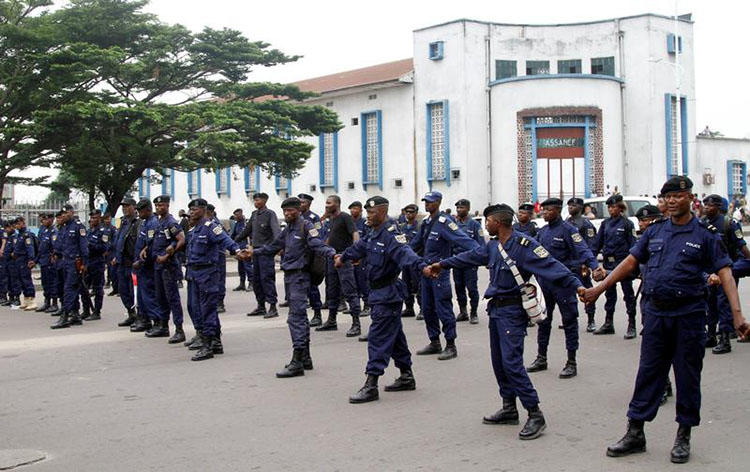On New Year’s Eve, as the world prepared to ring in 2018, Congolese journalist Edmon Izula was being repeatedly hit with a rifle and threatened at gunpoint by a member of the state security forces. Iluza was one of at least three journalists harassed by authorities that day, in a scenario that has become common during months of protests in the DRC.
CPJ has documented at least 27 cases in recent months of security forces briefly detaining, threatening, or assaulting journalists as they covered violence and protests calling for President Joseph Kabila to step down. Kabila’s second five-year-term was scheduled to conclude at the end of 2016, but his failure to relinquish power or hold elections that had been due in 2017 has led to a political crisis and protests.
During the same period, journalists’ ability to cover unrest and other events were further hampered by the DRC Telecommunications Ministry repeatedly ordering the shutdown of internet and telecommunication services.
“For three days [Cas-info] was not able to publish any information, even though there was a lot,” Izula told CPJ, referring to one of the outlets for which he is a correspondent.
In response to the attacks and harassment, CPJ’s Emergency Response Team issued a series of safety information cards that offer tips and recommendations for journalists working in the DRC, including on how to protect recorded content or use digital tools to help them report safely.
Several of the journalists harassed or detained by security forces said their equipment was confiscated, and recordings or images deleted.
Emmanuel Elameji wa Kabedi, a journalist with the U.N.-backed Radio Okapi, told CPJ that when police in the eastern city of Bukavu arrested him on November 30, they seized two phones, an audio recorder, and US$140. Elameji wa Kabedi was among at least six Congolese journalists detained covering countrywide protests that day, according to CPJ research. Similarly, CPJ documented how at least three of the 18 journalists detained on July 3 had photographs or recordings deleted.
When asked for comment about journalists being harassed or detained at protests, Colonel Pierre-Rombaut Mwanamputu, a spokesperson for the national police, told CPJ it was difficult for security forces to make the distinction between journalists and protesters.
Other DRC journalists with whom CPJ spoke said they often face harassment. “Journalists are always intimidated during the exercise of their profession, especially during protests,” Delphin Mupanda, a reporter with the community station, Radio Television, Rwanzururu-Beni (RTR), said.
Elameji wa Kabedi added, “[Authorities] only want praise, but when there is criticism from the media, they respond with threat and intimidation.”
Willy Akonda, a reporter with the privately owned news outlet Actualite, said that agents of the Congolese military intelligence service (DEMIAP) threatened him when he was arrested for taking photos that allegedly “compromised Kabila” on January 23. “The person in charge of that DEMIAP office identified only as ‘Major’ threatened me with death and said that he could shoot me without any problem because he only responds to the president,” Akonda told CPJ at the time. The DEMIAP head, Delphin Kahimbi, said the agency will take action against the officers, according to reports.
Aside from arbitrary detentions and equipment being confiscated, journalists have been affected by authorities consistently ordering internet access to be shutdown.
Since December 30, authorities shutdown internet and telecommunications on at least three occasions corresponding to nationwide public demonstrations, CPJ has found. Many journalists with whom CPJ spoke said the shutdowns increased risks associated with their reporting and heightened their concerns that the government could more easily surveil their communications. Without access to internet-based encrypted communication services, journalists had no choice but to use regular phone lines, which they believed the government monitors.
“The government listens to all the conversations,” a Kinshasa-based journalist, whose identity was withheld for safety reasons, told CPJ. The journalist added that their belief that authorities could surveil them means encrypted apps like WhatsApp have become essential to their reporting.
Internet shutdowns have also restricted journalists’ ability to upload recordings or publish online. Lambert Mende Omalanga, the Minister of Communication, acknowledged in a phone conversation with CPJ that the shutdowns affected the country’s press. “Many media [outlets] use internet to work. So, when you cut the internet of course there is impact,” Mende said.
CPJ emailed Telecommunications Minister Emery Okundji to request comment about the repeated shutdowns and their effect on press freedom, and the journalists’ claims of government surveillance. CPJ received email confirmation that the questions were received from one of Okundji’s advisers, in which the minister was cc’d; but as of April 3, CPJ had not received a further response.
- CPJ’s safety cards for Congolese journalists are available in English and French and include information on how to protect recorded information, communications, and sources’ contact details, as well as information on how to cover protests safely, and how to use digital safety tools.
[Additional reporting by Jonathan Rozen, CPJ Africa Program Research Associate]
